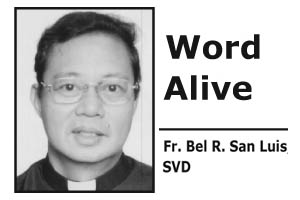THERE was once a professor in theology at a Catholic university. On his first day, he asked the students to write down what their notion of Jesus was.
While going over the papers later, the professor was amused by the many curious answers.
* * *
There was one that particularly caught his attention. The student wrote: “Jesus was a great P-R-O-F-I-T. He meant “prophet.” When the teacher checked the course he was taking, it was Business Administration. By the way, there are also people who use the name of Jesus for profit.
* * *
The gospel of this 4th Sunday relates about Jesus’ sad experience. When he went to his hometown and declared in the synagogue that he was, indeed, a prophet and the Messiah which the book of Isaiah referred to in the first reading (Luke 4,14-30). “This is Joseph’s son, surely?” they grumbled. “How can he claim to be a prophet, much less the Messiah?”
* * *
Sensing his audience’s negative attitude, Jesus said: “No prophet is accepted in his own native place.” The attitude of Christ’s Jewish town mates could be ours, too. We may not reject Jesus outright since Filipinos are generally religious and God-fearing. But there is the danger that we take our religion for granted.
* * *
The Sunday Mass going and prayers can become so routinary and mechanical that we don’t feel their meaning anymore. If you want to appreciate God’s Word and the Mass, one way is to take extra effort to do so.
There are prayer-meeting groups who come together and do the “Bibliarasal.”
* * *
Not content with just being members of the church, they seek to know the will of God from the Scriptures and find concrete ways to apply it in their homes, neighborhood and workplaces.
* * *
Another lesson of this Sunday gospel concerns relationship with one another. Jesus’ town mates could not accept him because he was too familiar to them. Remember the old dictum, “Familiarity breeds contempt”?
Some people joke that when couples are newly married, the word ASAWA (spouse) is complete. But as the years pass, the letters disappear one by one: from “asawa” to “sawa,” (fed up) to “awa” (pity), and finally “wa” (no more)!
* * *
The Sunday gospel teaches that we must have faith to believe in Jesus as God’s spokesman (prophet) and the Messiah even though he was the son of a simple and poor carpenter from Nazareth. Likewise, we need faith to see the goodness of people we live or work with beyond their undesirable traits and human frailties.
* * *
THE LIGHTER SIDE. A teacher was drilling her high school students in English vocabulary.
“How do you call a marriage having many wives?” “Polygamy,” replied one student. “How about a marriage having two wives?” “Bigamy,” answered another. “How about a marriage having only one wife?”
“Monotony,” blurted a naive lad. He meant “monogamy.” That lapsus linguae highlights a human tendency in relationships, like marriage, wherein we take people for granted due to familiarity. * * *
NEW SVD PRIESTS. Yesterday, Feb. 2, four SVD deacons were ordained priests at the Holy Spirit Seminary Chapel, Tagaytay City.
Called “Sibol Class,” the newly-ordained are: Fr. Vincent Rey Bahian, missionary to Germany; Fr. Christian Moises Estrada to Japan; Fr. Elmer Hernandez, to Hungary; Fr. Harle Piga to Vietnam.
Ordaining prelate: His Eminence Orlando Beltran Cardinal Quevedo, OMI, DD.
* * *
SUPPORT SEMINARIANS. The newly-ordained SVD priests started as seminarians. Hence, seminarians are future priests, missionaries and bishops. We cannot have them if there are no seminarians.
So let’s support them.
* * *
Chip in an amount or sponsor a seminarian’s schooling for one year. For inquiry, e-mail me at: belsvd@gmail.com.



